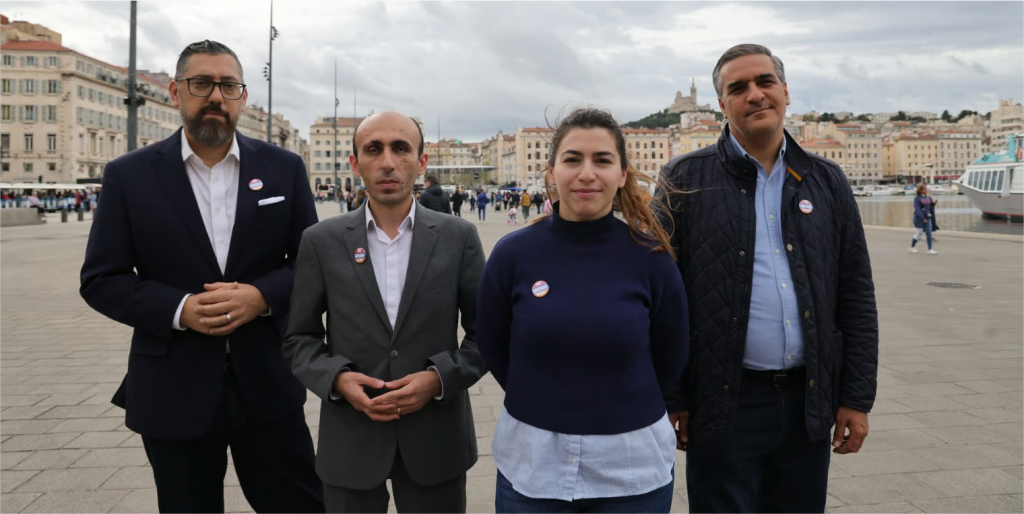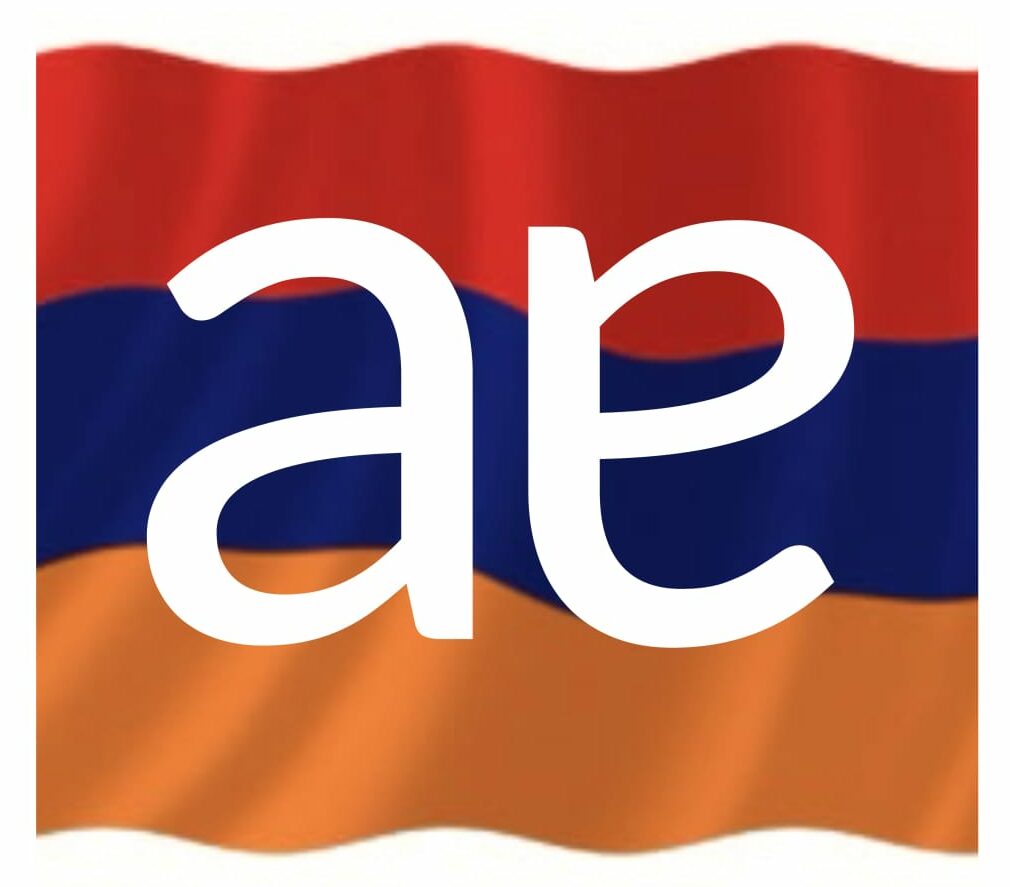
An international delegation advocating for human rights is travelling across Europe to raise awareness among leaders and the public about the plight of 23 Armenian hostages detained in Baku, Azerbaijan. Last Saturday, the delegation stopped in Marseille as part of its international awareness campaign, after visiting Brussels, Paris, and Lyon, and before heading to London and Berlin. The goal: to secure their release before the start of COP 29 on climate change, which will take place in Baku.
Anahit Akopian, President of the ARF’s Hay Dat – Armenian National Committee, France (CDCA), directly addresses European leaders: “You will not be able to claim ignorance.” In the context of rising tensions, the delegation, which includes Artak Beglaryan, former Minister of State of Artsakh and human rights defender, alongside Arman Tatoyan, former Human Rights Defender of the Republic of Armenia, and Karnig Kerkonian, an American lawyer specialising in international accountability, denounces the systematic violations of human rights committed by Azerbaijan against the Armenian population of Nagorno-Karabakh.
Their objective is clear: to mobilize the international community to put diplomatic pressure on the Azerbaijani government for the immediate release of the hostages, among whom are former high-ranking officials from Artsakh, including former presidents of the republic, foreign ministers, and defenсe ministers. Anahit Akopian warns of the urgency of the situation: “After COP 29, we risk losing all leverage.” The testimonies of survivors from Baku’s prisons are harrowing: physical torture, mutilations without anaesthesia, deprivation of food, all practices that violate international conventions on the treatment of prisoners and underscore the urgency for international intervention. “To participate in COP without addressing the issue of the hostages is to condone these acts,” she concludes.
Several French political figures, including Anne Hidalgo, Valérie Pécresse, Xavier Bertrand, as well as Benoît Payan and Renaud Muselier, have already announced their intention to boycott COP 29, denouncing the stark contradiction between the event’s environmental objectives and the repressive practices of the Baku regime.
The delegation held a public discussion at the Act 12 Theatre, aiming to raise awareness of this humanitarian crisis. “We must expose the inhumane conditions to which these hostages are subjected, as well as the genocidal intent of the Azerbaijani government, which seeks to erase the Armenian identity from Nagorno-Karabakh through ethnic cleansing,” explains human rights expert Arman Tatoyan. In 2022, there were still 120,000 Armenians living in the region; today, only 14 remain, trapped by an implacable blockade. The rest have been forced to flee or have been displaced, a reality that constitutes a flagrant violation of fundamental rights, including the right to freedom of movement and personal security.
This advocacy campaign also highlights the greenwashing orchestrated by the Azerbaijani regime to polish its image on the international stage. “Azerbaijan is a major actor in the oil and gas industry, with 90% of its economy based on hydrocarbons,” notes Artak Beglaryan. “Allowing such a regime to position itself as the host of COP 29 is paradoxical, especially given that this government engages in human rights violations against both its own population and ethnic minorities.”
The CDCA is also calling for international recognition of the situation faced by Armenians in Artsakh and advocates for their return to their ancestral lands, currently threatened by Azerbaijani forces. “Azerbaijani troops have already been deployed in the southern regions of Armenia, and the risk of new military offensives is imminent. The international community must take concrete steps to prevent this escalation,” the delegation warns, stressing the urgency of action before the situation deteriorates further.
The Right to Return: A Fundamental Principle Enshrined in International Law
The delegation aims to raise awareness among various foreign ministries ahead of COP 29 regarding the pressing issues surrounding the right of return for the Armenian population of Artsakh. This critical initiative seeks to ensure that the plight of those displaced is not overlooked, highlighting the urgent need for international attention and action to uphold their fundamental rights.
It is important to remember that the right of return is not a new concept in international law, with numerous precedents already established. The report highlights a variety of conflicts, including those in Palestine, Bosnia, Kosovo, and Myanmar. In each of these instances, the right of refugees to return has been recognised as a fundamental component of peace and justice processes. Furthermore, organisations such as Human Rights Watch and legal mechanisms like the International Court of Justice (ICJ) have played a crucial role in the recognition of this right.
A pivotal moment in this legal battle occurred on November 17, 2023, when the International Court of Justice, seized by Armenia, issued a crucial ruling in Armenia vs. Azerbaijan case. The Court ordered Azerbaijan to allow Armenians from Artsakh to return home, “safely, unhindered, and in dignified conditions”. The ICJ also highlighted the blatant human rights violations committed by Azerbaijan, including obstruction of humanitarian access and restrictions on the free movement of people and goods in the Lachin corridor, the only route connecting Armenia to Artsakh.
This decision by the ICJ represents a turning point in the struggle for recognition and protection of the right of return for Armenians from Artsakh. It reaffirms that even in times of war, the fundamental rights of displaced individuals must be guaranteed, imposing clear obligations on Azerbaijan.
International Reactions and Diplomacy in Favour of Return
In recognition of the right of return extends beyond legal frameworks. Since the 2020 war, and especially after the dramatic events of September 2023, the international community has expressed support for this right within diplomatic efforts aimed at resolving the crisis. In October 2023, during a quadrilateral meeting in Granada involving Armenia, France, Germany, and the European Union, it was emphasized that “Armenian refugees must be free to exercise their right to return to their homes unconditionally, under international supervision and with respect to their history, culture, and human rights.”
Many international institutions, such as the UN, Council of Europe, and the European Parliament, have also taken a stand on this issue. The European Parliament, in particular, has adopted several resolutions since 2021 reaffirming the importance of the right of return in resolving the conflict between Armenia and Azerbaijan. In a resolution adopted in March 2024, the European Parliament called for security guarantees for Armenians from Artsakh wishing to return to their homes and urged sanctions against Azerbaijan for its military actions in the region.
France: A Leader in Defending the Right of Return
France has played a central role in advocating for the right of return for Armenians from Artsakh. As early as November 2020, the French Senate adopted a historic resolution calling for the recognition of the Republic of Artsakh and ensuring the return of refugees. This resolution was followed, in January 2024, by a second statement condemning Azerbaijan’s actions and calling for the implementation of economic and diplomatic sanctions against Baku.
Foreign Minister Catherine Colonna has taken a strong position, denouncing the “serious crimes” committed by Azerbaijan during its military offensive in September 2023, describing these acts as “a flagrant violation of the rights of Armenians to live in peace on their ancestral lands”. Colonna reaffirmed that displaced Armenians had “the right to return to their homeland” and that this issue would be brought before the UN Security Council.
Transatlantic Support
The United States has also been at the forefront of defending the right of return for Armenians from Artsakh. Numerous American political figures, both Republican and Democratic, have supported this right and called for concrete actions. In March 2024, over 60 members of the U.S. Congress signed a letter to Secretary of State Antony Blinken, urging the government to pressure Azerbaijan to ensure the safe return of Armenian refugees.
Canada has also expressed its unwavering support. In October 2023, during a visit to Yerevan, Canadian Foreign Minister Mélanie Joly stated that the right of return for Armenians must be “at the heart of any sustainable peace process”. She also emphasized that sanctions against Azerbaijan were being considered if it continued to obstruct the rights of Armenians.
The implementation of the right of return for Armenians from Artsakh is seen by many experts and political actors as an essential condition for peace and stability in the Caucasus region. Without this right, the risks of renewed violence, heightened ethnic tensions, and discrimination will remain high. The report from the Armenian Cause Foundation underscores the importance of concrete measures to accompany this return, including the protection of Armenian cultural heritage, international supervision of the affected areas, and security guarantees for displaced populations.
The report also calls for increased mobilization from the international community to enforce the decisions of the International Court of Justice and to prevent future human rights violations in this region. Beyond historical justice, this is a matter of human dignity and respect for the fundamental principles that govern international relations.
The Swiss Parliament: A Model Resolution for the Return of Armenians from Artsakh
Let us add that the problem has already been discussed in the Foreign Policy Committee of the Swiss Parliament, which instructed the Federal Council to organize an international peace forum on the Nagorno Karabakh conflict as soon as possible, but not later than within a year. The goal is to ensure an open dialogue between representatives of Azerbaijan and Nagorno-Karabakh Armenians, which will be held in the presence of international supervision or important international actors, to discuss the issue of the safe and joint return of the historically displaced Armenian population.”
In the justification of the initiative, it is mentioned that as a result of the military attack of Azerbaijan in September 2023, Nagorno Karabakh, except for a few people who are unable to move, has been completely depopulated.
“Fearing the repetition of the Armenian Genocide, as it happened in 1915, the native Armenian population (of Artsakh) was forced to leave their homes in just a few days. Since then, the region has experienced documented ethnic cleansing. Armenian cultural heritage such as churches, monasteries and cemeteries are being systematically destroyed or transformed under the guise of “renovation”. Despite these serious developments, the Armenians of Nagorno-Karabakh continue to remain faithful to their decisions to return to their homeland, to receive security guarantees from the international community, to determine their political future independently and to exercise the right to democratic self-governance,” said the commentary of the Foreign Policy Committee of the Swiss Parliament.
The right of return of the Armenians of Artsakh is therefore not just a legal or political issue, but also a test of the international community and its ability to protect human rights.
Main source: laprovence.com

